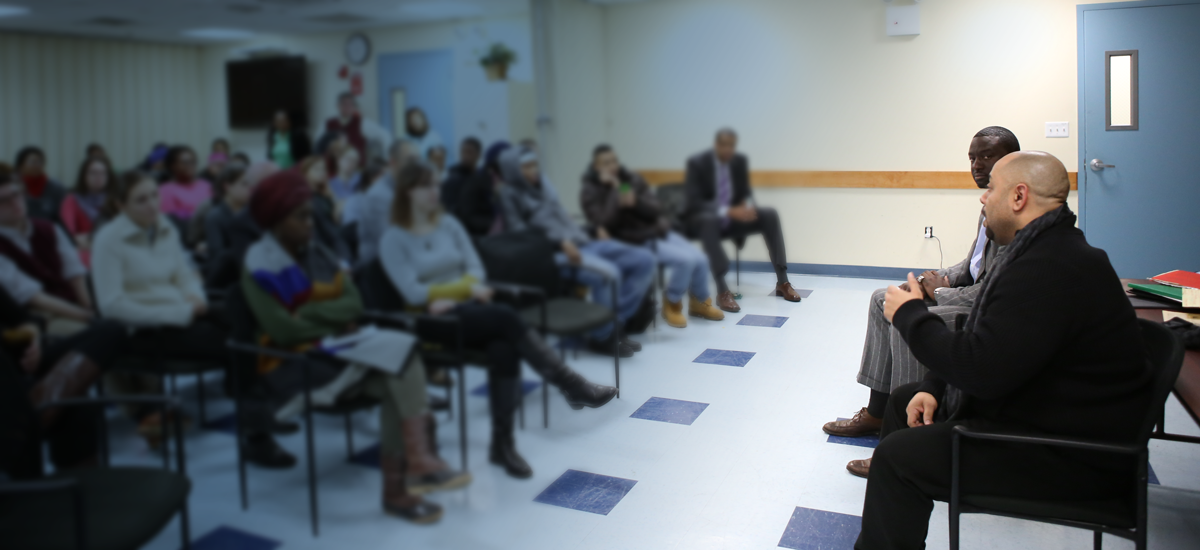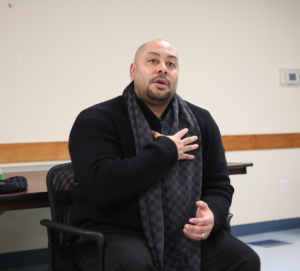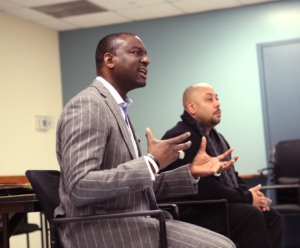Saquan echoed what 60 clients and staff felt after hearing the inspirational words of Raymond Santana and Yusef Salaam at JCCA’s Brooklyn office recently.
Along with three other innocent men, Raymond and Yusef were unjustly convicted of rape in 1989. They endured years of being vilified by the media and standing trial. After being found guilty and sent to prison, each spent between 6 and 13 years in prison before their exoneration and release. They eventually won a settlement from New York City, as compensation for being wrongly accused and imprisoned. They went to prison as teenagers and came out as adults.
- Raymond Santana
- Yusef Salaam
Ronald E. Richter, CEO of JCCA, said, “The question for JCCA in connection with this historic miscarriage of justice is how we help our young people live in a world where they are assumed to be guilty, pretty much wherever they find themselves. In many ways, the world they encounter is hostile toward them. It has a real impact on their souls, and studies show that young black and brown boys begin to experience this type of profiling and discrimination as early as fourth grade. I’m very proud that JCCA strives to be a small part of the solution, helping these young men and women overcome the suspicion they encounter.”
Both Raymond and Yusef described the terrible ordeal of being arrested by the police and interrogated the first night as innocent 14-year-old teenagers. “I was full of fear and uncertainty,” states Yusef.
Yet after their years of unjust imprisonment, neither man shows anger or bitterness.
“I learned to channel the anger and try to be productive,” says Yusef. “Being bitter is like drinking poison.”
What kept them going when the years stretched on and they had no hope of an early release?
They searched for meaning. Raymond Santana found it in pursuing education. “I was lucky to find a teacher who had been in prison and became a professor. He inspired me to learn more and I got involved in working with the prison administration on education issues. That led to bigger things; I got my GED and an education.”
Yusef, too, found education in prison, and also turned to spirituality and the Bible. “I read the story of Joseph, who was unjustly imprisoned as a youth and went on to do great things. That motivated me,” he explains.
When asked what advice as a grown man he would give to his younger self, Yusef replied, “I would tell him to find someone to trust who would help him.”
“So often our children are abandoned by their families, their schools. They feel alone. At JCCA, we understand and work very hard to connect to our teens and slowly build a bond of trust that will help them begin to heal,” adds Ronald Richter.
Since being released, the men have spoken to countless organizations, large and small. They participated in a documentary film and are both writing books and advocating on social media, urging audiences to get involved in such organizations as the Innocence Project. “If I can save one life, then it is worth it,” says Raymond Santana.
“These men and the JCCA staff have helped me a lot by channeling my anger. I feel like my future is bright,” adds Saquan.
Let us know what you thought of the presentations at jcca@jccany.org.


